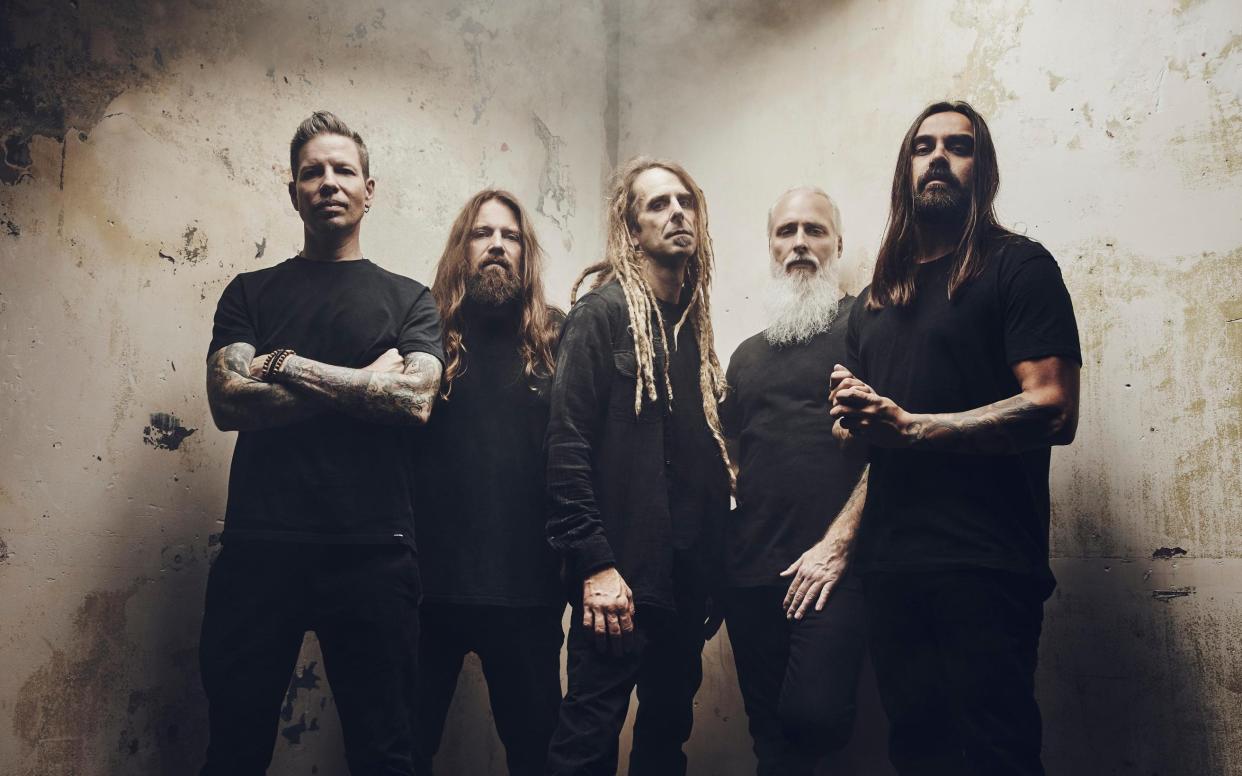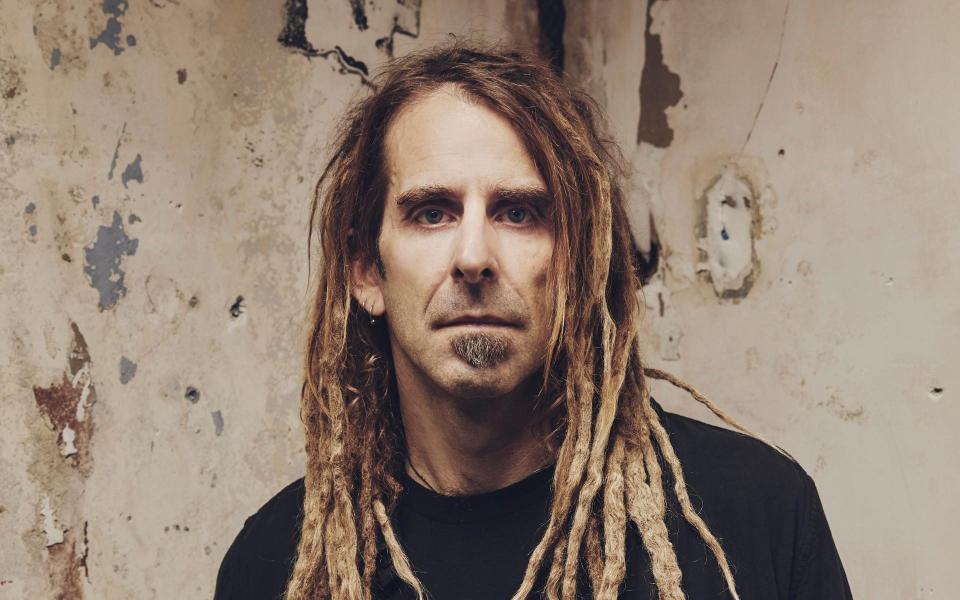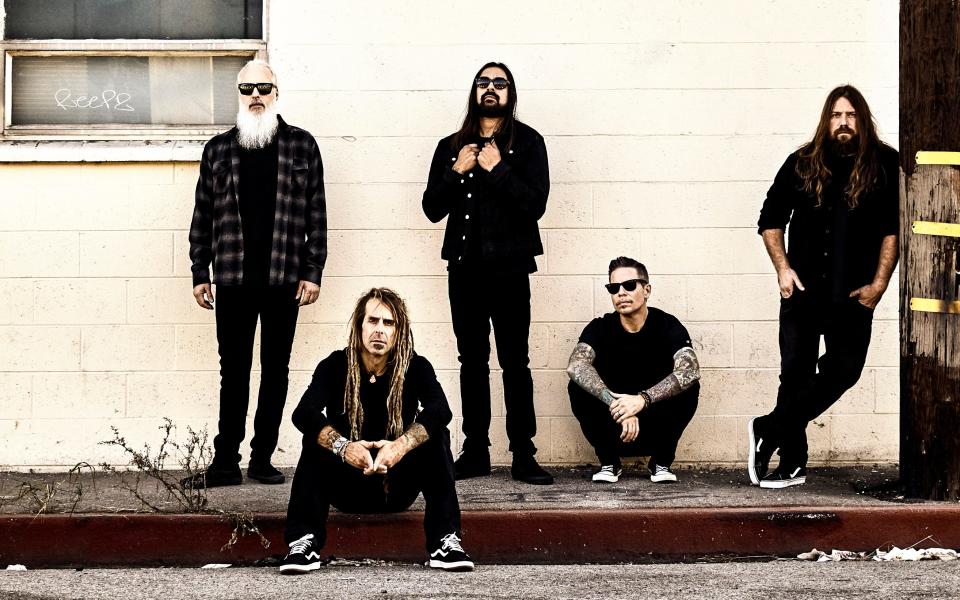Metal's moral backbone: the uncompromising, righteous rise of Lamb Of God

As a younger man, D. Randall Blythe conducted social experiments with bleach. As jocks in passing cars screamed insults, the singer with the metal band Lamb Of God walked the streets of his home city of Richmond, Virginia, with his barnet dyed in various cartoon hues. More than red and yellow and pink, it was the colour green that drew the greatest outrage. Delighted, a ‘do in the refined shade of Kermit the Frog became his favourite style.
“It made people so angry,” he says. “So angry. People would drive by just screaming at me. And I thought, ‘You know, the reason that people are so mad at me with my green hair is because I’m doing precisely what I want to do.’ And they see that… and perhaps they feel constrained by their own life. Constrained by societal pressure. And there I was, rejecting that outwardly.”
This ordinary anecdote says much about D. Randall Blythe – Randy to his friends – and a great deal about the enduring appeal of the kind of metal played by Lamb Of God. What detractors regard as a terminal case of arrested development is seen by supporters as a resonant rallying call to a community that refuses to be tamed. In mainstream circles men of a certain age fret that rock might be dead; but at the heavier end of the market business remains bulletproof.
Were it not for a planetary pandemic, today Lamb Of God would be en route to the Veterans United Home Loans Amphitheater, in Virginia Beach, to play to 20,000 people as part of a two-month North American co-headline tour with Megadeth. The quintet’s last three LPs have each pierced the top three on the US album chart; their latest, Lamb Of God, released last week, will likely do the same.
“That kind of stuff isn’t really important,” Blythe tells me. “I guess it’s nice, I suppose; I mean it’s better than people telling me we suck and throwing s___ at us.”
When Lamb Of God decided to sign with Epic Records – home of Michael Jackson, George Michael, ABBA, and more – Randy Blythe laid out several conditions to the company’s president, Polly Anthony. Over dinner, in 2004, the singer explained that he would brook no interference when it came to the kind of music his band writes, the producers with whom they work, or the kind of management they employ to handle their affairs. Ms. Anthony was also told not to expect any radio hits.
This final stipulation is particularly pleasing. The day that Lamb Of God are granted mainstream airplay is the day its members storm a radio station and take its programmers hostage. In metal, there is precedent for this kind of recalcitrance. In 1986, at the height of the age of MTV, Metallica earned a platinum disc for the feral yet disciplined Master Of Puppets despite the absence of a single – not a hit single, any single - or a music video. With this, a genre that had too often been toothless and dumb suddenly began to sharpen up its act.
Others took note. Over the years groups such Slayer, Pantera, Slipknot, System Of A Down, and Tool have flooded the public space with multi-platinum music that laughs in the face of commercial norms. For more than 30 years, metal’s direction of travel has been a relentless march in ever heavier and weirder directions. With this, the genre has attained, and maintained, a level of cutting-edge innovation for which it is never properly credited. For their part, Lamb Of God are worthy conspirators to the cause.
“I think that kind of freedom spreading outward from the underground to the mainstream… has got to be a good thing,” says Blythe. “Because maybe its subconsciously liberating people’s minds. It’s saying maybe it’s okay to be a little bit weird.”

Randy Blythe was more than a little bit weird. Walking the streets of Richmond with Technicolor hair, he was both a hard worker and a degenerate alcoholic. Grafting as a roofer, or as a grunt in local restaurants, he would sometimes be arrested for public nuisance and ferried to the nick for the night. As a member of Lamb Of God, in 2000 he helped write the song O.D.H.G.A.B.F.E. – Officer Dickhead Gets A Black F______ Eye – following a run-in with the authorities in San Francisco.
All of which seems at odds with the bespectacled man with whom I am speaking via – what else? – Zoom. Randy Blythe is a likeably spiky interviewee who inspects each question for flaws and corrects them before I’ve finished speaking. As well as the singer with a blue-chip metal band, he is also the author of one well-written, bestselling memoir, Dark Days, and a professional photographer. In the age of the iPhone, he never leaves home without a book. It’s been almost eight years since he last took a drink.
“I take 100% responsibility for my actions, good and bad,” he says. “When it comes to alcohol, my relationship is different from other people’s, which I think is one of the things that is most misunderstood about alcoholism. It was nothing that I ever wanted. Other people can take a few drinks when they’re young… [but] for people like me, that doesn’t happen. I drank and made myself do some crazy things, but I didn’t make myself an alcoholic. I just am an alcoholic.”

No genre of music has a more celebratory, and a less healthy, relationship with the grape and the grain than metal. For years in the 1980s, Metallica reveled in their nickname Alcoholica, while in the 21st Century Jeff Hanneman consoled himself following his exile from Slayer by drinking himself to death. Drugs can also feature. Following a concert at the Abaton club, in Prague, on May 24 2010 Randy Blythe commemorated the death of his friend Paul Grey, from Slipknot, by downing Jagermeister. Grey had passed away in Iowa following an overdose of morphine.
“The music industry has a lot of partying, easily accessed free drugs and booze, and very [few] restraints on behaviour,” Blythe writes in Dark Days. “[There is] almost no level of accountability to any sort of boss. As long as you can get onstage or into the studio and still do your job, no one in the business really cares. You are a cash cow. Milk ‘em ‘til they’re dead… and move on to the next young calf.”
About the only Randy Blythe recalled from Lamb Of God’s appearance at the Abaton club was that the show was chaotic and badly organised. What he didn’t know, and would not know until he was arrested by police from the Czech Republic two years later, was that a young fan had died after allegedly being pushed by the singer from the stage. Arriving in Prague in June 2012, Blythe was charged with manslaughter.
The case against him stated that after being forced back into the audience, Daniel Nosek hit his head on the venue’s concrete floor causing an injury from which he later died in hospital. Randy Blythe spent more than a month in a Czech prison before being released on bail on August 2nd. Questioned by reporters as he departed Ruzyne Airport, the singer stated that “I am no flight risk. I am an international touring artist [and] I have to clear my name. So, yes, I will come back here if I am called to court.”
“A young man was dead, and I was possibly to blame,” he writes in Dark Days. “Indeed, if I was to blame, if this tragedy was truly my fault, I knew that no matter how frightening, I could not run from a just and deserved punishment. Not if I still wanted to call myself a real man.”
He meant it, too. Upon his return to Richmond, Blythe consulted his journal with trepidation; if he had written that he had taken a drink prior to the show at the Abaton, he would plead guilty to the charge that faced him. He did not recall pushing Nosek from the stage, but he couldn’t be sure. In February 2013, after being found not guilty at a trial at which the state prosecutor spent much of his time asleep, Blythe met members of Daniel Nosek’s family, who at no point had asked that he be punished.
When I suggest to Randy Blythe that he might feel proud of facing the horror-movie music in Prague when others in his position would have declined to return to the city – and as he himself had been urged to do by some of his peers - the matter is given short shrift.
“I think it’s a mistake to give yourself a cookie for doing the right thing,” he says. “I have to come to peace with myself. I don’t deserve a cookie for not waking up and drinking 12 beers like I used to. I don’t deserve a cookie for acting like a normal human being. And I view everything through that lens. I don’t deserve a cookie for doing the right thing [in the Czech Republic], whether that’s scary or not. Because life is a scary process.”

Reading Randy Blythe’s unflinching and humane account of his ordeal in Prague, in Dark Days, is a bracing experience. As well as much else, it caused me to question my own behaviour. I remember well the first stage-dive of my own brief aeronautical career, at a concert by the American punk band the Circle Jerks, and recall vividly the surge of exhilaration as I left the stage – legs pointed skywards, torso angled sideways - thinking, "My God, I’m in mid-air!" Never did it occur to me that the platform behind me was a place of work for performers who might not welcome my presence.
By 2010, musicians had even greater cause to fear their audience. At a performance at the Alrosa Villa club in Columbus, Ohio, the former Pantera guitarist ‘Dimebag Darrell’ Abbott was shot to death on December 8 by 25 year old Nathan Gale while playing with his band Damageplan (three others died at scene, while four more were injured). Abbott’s brother, Vinnie Paul, who played drums for both bands, wrote a letter for the judge at the trial in the Czech Republic about the things that can happen on a stage not unlike the one at the Abaton.
“I’m not a fan of crowds before or after [the accident],” says Blythe. “I don’t like crowds in general; I go out in them but I don’t like them. Something really bad happened [in Prague] and we dealt with it and we got through it. But the audience is pretty much the same, so I don’t run around living in terror of crowds.”
Today the crowds gathered in cities in the United States, and across the world, are not there to see Lamb Of God. As America convulsed following the killing of George Floyd, Blythe hit the town in the erstwhile capital of the Confederated States of America and took pictures of protesters “redecorating” the statue of general Robert E. Lee that dominates Monument Avenue. The singer believes the landmark should be removed and placed in a museum, graffiti and all.
But Randy Blythe is not an agitator hired from Central Casting. The first time I met him, in Richmond, he wore a t-shirt bearing the words ‘God Is Southern’. He lives within driving distance of Jamestown, Virginia, and appreciates its significance as the first permanent English settlement in the Americas. He speaks of the South as the birthplace of jazz, of the blues, and of rock’n’roll. Blythe calls strangers “sir” and “ma’am”, and bristles at the enduring belief of certain Yankees that Southerners are stupid.
“We’re not all hayseeds down here,” he says. “We’ve produced great literature. Great works of art. Science. You have to look at the entirety of the South to understand that. Have we had our problems? Yes. But we’re not all hayseed rednecks, so give me a break.”
Lamb Of God obliquely address these issues on Redneck, a searing song from 2006. The accompanying video sees the musicians mistakenly booked to play a children’s party by parents who believe the band’s name to be that of a Christian group. In this slimmest of seasons for live music, a concert at which kids and their parents flee in terror might just be preferable to a summer in which the largest arenas in the United States go unvisited. Either way, D. Randall Blythe remains unfazed.
“I’m a musician, which means that I do this whether there’s a financial return or not,” he says. “I take photos whether there’s a financial return or not. I write whether there’s a financial return or not. It’s what I do. It’s how I process my life. And I think art is more important than ever right now, because it lifts people’s spirits.”
Lamb of God is on release now

